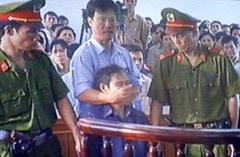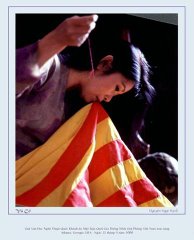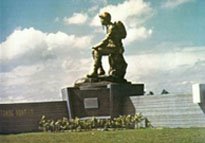FNA reporting from Hanoi
For over a month, the Vietnamese communist authorities have been desperately seeking to repress democracy activists in Vietnam. This campaign started on February 2nd, 2007 with the illegal raid on the Thien An law office as attorney Le Thi Cong Nhan was explaining human rights issues to a number of students. On the night of Feb 2, police conducted a search of the law office, confiscating personal items and documents belonging to attorney Nguyen Van Dai. In the afternoon of Feb 4, police proceeded to search attorney Nguyen Van Dai's and attorney Le Thi Cong Nhan's residences, confiscating their some of personal items and documents in the process. In the following days, the two attorneys were continuously summoned by police for questioning.
On Feb 10, 2007, under pressure from the communist police, the Approval and Disciplinary Board of the Hanoi Lawyer Association invited attorney Nguyen Van Dai to a working session. Attorney Nguyen Van Dai declined because of a doctor's appointment.
The police also exerted pressure on the Business Registration Office of Hanoi's Planning and Investment Bureau to issue a decision to cancel its permit to the TNHH Translation and Legal Consultation Firm on Feb 28, 2007, which Mr. Nguyen Van Dai is a co-founder and the executive director.
On March 1, 2007, the Approval and Disciplinary Board of the Hanoi Lawyer Association invited attorney Nguyen Van Dai for a second time to a working session on March 12, 2007.
An FNA reporter met with attorney Nguyen Van Dai to find out about his views of recent events and developments that had a personal impact on him.
Attorney Nguyen Van Dai said that his activities revolved around human rights and democracy, and as a result, he had been entertaining ties with and involved in providing legal assistance to the majority of democracy activists in the country. These activities had angered the communist authorities, and throughout 2006, they had summoned him countless times for interrogation, put him under close surveillance, spied on his telephone communications and cut his phone line many times. Most recently, they simultaneously cut six phone lines belonging to his firm and staff on Feb 23, 2007.
About currently being the subject of a police investigation based on Article 88 of the Criminal Code, he said all documents confiscated by the police from his residence and law firm had been publicized on the internet, and that anyone could have had access to them. Under Vietnam's constitution, citizens had the right to information, and he like other citizens had the right to access, store and study such information in perfect legality. In the spirit of Article 88, only individuals who use documents to oppose the government, that is to oppose the legislative, executive, and judiciary branches by instigating violent and illegal armed action would be considered to be in violation of the law. In contrast, to use those documents to advocate freedom, democracy and human rights to build a fair, democratic and civilized society should on the other hand be praised and rewarded by the authorities.
About the Business Registration Office's decision to cancel the TNHH Translation and Legal Consultation Firm's business registration, attorney Nguyen Van Dai indicated that the Business Registration Office had acted erroneously when concluding that his firm had commercialized the documents in question. According to Section 3 of Article 7 of the Business Law, "it is forbidden to engage in business activities harmful to national defense, security, order, social safety, historical tradition, culture, morality, Vietnamese mores, and the people's health, and harmful to natural resources and the environment." First, attorney Dai's firm did not engage in the commercialization of documents with such content, and second, there had not yet been any conclusion issued by any agency according to which the documents confiscated at the firm had content that opposed the Vietnamese government. According to attorney Nguyen Van Dai, those documents dealt with human rights and democracy, and more importantly, those documents belonged to him personally and not to the firm. When reference was made to commercialization, there had to be trading activities which Mr. Dai's firm had not carried out and which the communist police had been unable to prove.
Attorney Dai further said that one of his firm's shareholders was a Vietnamese with US citizenship and he would therefore ask that the US government examine this matter because it involved a US citizen's investments in Vietnam. The communist authorities' wish to repress a Vietnamese citizen's attempts to advance freedom, democracy and human rights had now resulted in the interference in the investment and business activities of a foreign citizen, which in this case was a US citizen. The communist government could expect complications out of this issue.
About the invitations by Approval and Disciplinary Board of the Lawyer Association to working sessions, attorney Nguyen Van Dai indicated that the authorities had long wished to remove the attorney title from his name, because the Lawyer Association had been arguing that he had been taking advantage of his lawyer credentials to carry out unacceptable activities. However, they failed to realize that he was also a member of such international lawyer associations as the Advocates International Association, and Advocates Asia, and he therefore did not need the membership in the Hanoi Lawyer Association to possess a lawyer's credentials. He would keep his lawyer title for the rest of his life even if he ceased to be a member of the Hanoi Lawyer Association.
When asked if he was prepared for the possibility that the communist authorities would pressure the Hanoi Lawyer Association to expel him, attorney Dai said that he had been thinking about that possibility since he had first become involved in the activities to promote freedom, democracy and human rights. He emphasized that as long as Vietnam had not achieved freedom and democracy, he would not accept to use his legal profession to make a living, but would use the profession to help unfairly treated compatriots and to defend religious and pro-democracy activists subjected to harassment. Attorney Dai continued: "It seems that the communist authorities are doing their best to train and turn me into a professional political activist; they do not want me to operate as a lawyer specialized in human rights and religious freedom."
When asked what he would do if deprived of his law office to practice his profession and conduct business, attorney Nguyen Van Dai said: "First, I will be fighting till the end to protect my business freedom and my right to practice my legal profession. Should the communist authorities illegally take away my right to do business and to practice my profession, I would still have a range of options to consider, but it would appear that everybody including the Communists is wishing to see me become a politician mobilizing the masses and directly struggling for the democratization of Vietnam. Deep down, I have always wanted to just be a human rights lawyer, but historical circumstances seem to be steering me in another direction. I still have time to pray God for his guidance in my final decision. Whatever my action I always wish to be encouraged and supported by the people inside the country, compatriots living overseas and the international community. The Vietnamese people's struggle for freedom and democracy is far from over and will still encounter many difficulties. However, as the path of truth and righteousness, it will receive the undivided support of the people and the support from the international community and will undoubtedly meet with success."
Freedom of Speech Under Communism

Favorite Videos
We Will NEVER Forget.....

Favorite Links
Gone...but not forgotten.



Why this Blog?
There are 2 main reasons for this site:
1) There are many young Vietnamese who care about issues concerning Vietnam and the Vietnamese Diaspora, but cannot, or are not very proficient, at reading Vietnamese. Therefore, this site compiles and disseminates these news in English, so that the new generation of Vietnamese around the world can become more aware and, thus, closer to issues in the homeland.
2) Young Vietnamese have many ideas, many differing views on the prospects to democratize and develop Vietnam. The argument for peaceful development verses demands for justice and human rights. Which comes first? Can a civil, peaceful society be built without foundations of social justice?
These are the issues YOU can debate on this site. But remember, say what you mean, and mean what you say, but don't be mean when you say it.
1) There are many young Vietnamese who care about issues concerning Vietnam and the Vietnamese Diaspora, but cannot, or are not very proficient, at reading Vietnamese. Therefore, this site compiles and disseminates these news in English, so that the new generation of Vietnamese around the world can become more aware and, thus, closer to issues in the homeland.
2) Young Vietnamese have many ideas, many differing views on the prospects to democratize and develop Vietnam. The argument for peaceful development verses demands for justice and human rights. Which comes first? Can a civil, peaceful society be built without foundations of social justice?
These are the issues YOU can debate on this site. But remember, say what you mean, and mean what you say, but don't be mean when you say it.
Blog Archive
-
▼
2007
(106)
-
▼
March
(28)
- A Show (and Tell) Trial in Vietnam
- Dissident Catholic Priest Sentenced to 8 years in ...
- Dissident Catholic priest challenges Vietnam court
- The Not-So-New Vietnam - Wall Street Journal
- Vietnam repeals detention practice
- Vietnam crackdown targets dissidents
- Some liberties thrive, but communist regime allows...
- Democracy Alert: Growing Repression in Vietnam
- Vietnam Security Forces Threaten Family Members Of...
- Vietnam: Getting Away With Murder (Human Rights Re...
- Vietnam Watch News Roundup -- March 25, 2007
- Vietnam Watch News Roundup -- March 23, 2007
- Vietnam rejects Human Rights Watch's ‘wrongful rem...
- Vietnam Watch News Roundup -- March 21, 2007
- Journey from the Fall opens this Friday
- Interview with the wife of attorney Le Quoc Quan a...
- Human Rights Watch condemns Vietnam "crackdown" on...
- Vietnam to Consider Freeing Journalist After Inqui...
- Top Vietnamese Buddhist Slams Detentions Amid Ongo...
- Authorities refuse to renew BBC correspondent’s visa
- Republican lawmakers blast Vietnam rights violatio...
- Rep. Lofgren Calls on Secretary of State Rice to A...
- Vietnam: Crackdown on Dissent in Wake of WTO and APEC
- Kinks in Vietnam's armour
- 3,000 workers at Taiwanese factory in Vietnam go o...
- Vietnam police arrest two dissident lawyers in Hanoi
- Vietnam's communist authorities' desperate repress...
- Vietnam: A Paradise Haunted by Human Rights Abuse
-
▼
March
(28)

No comments:
Post a Comment